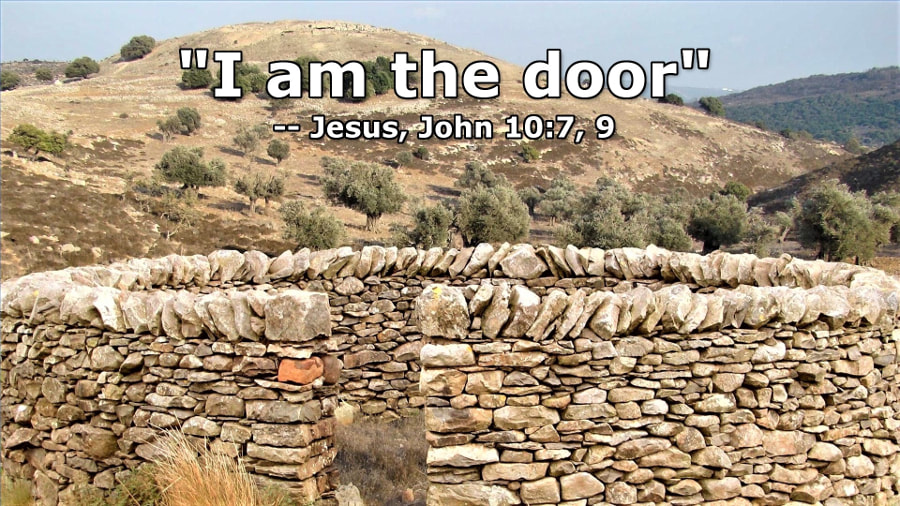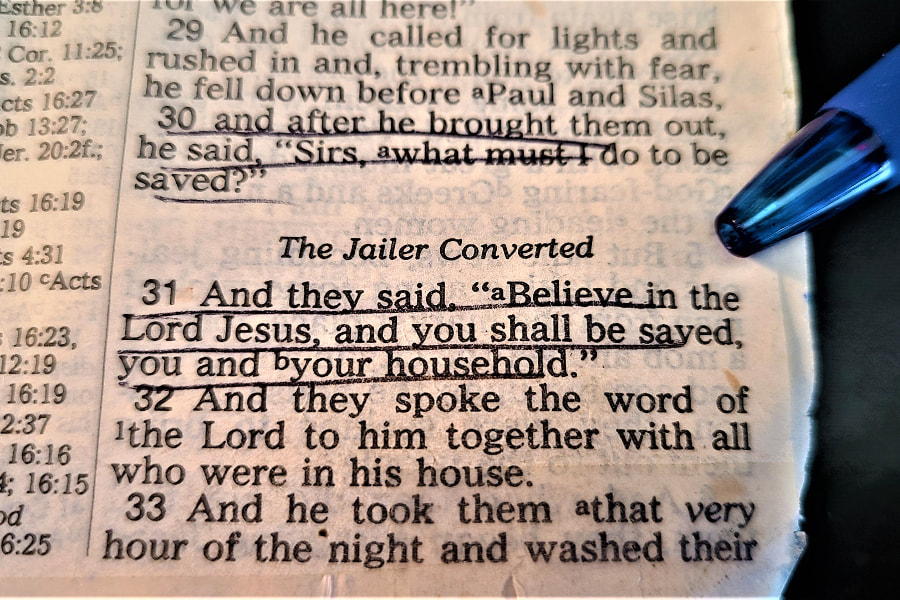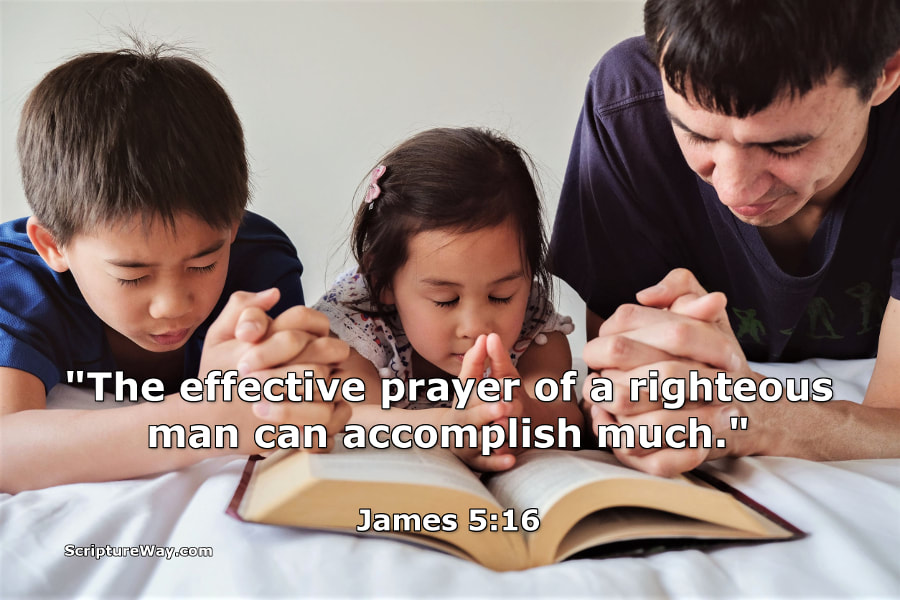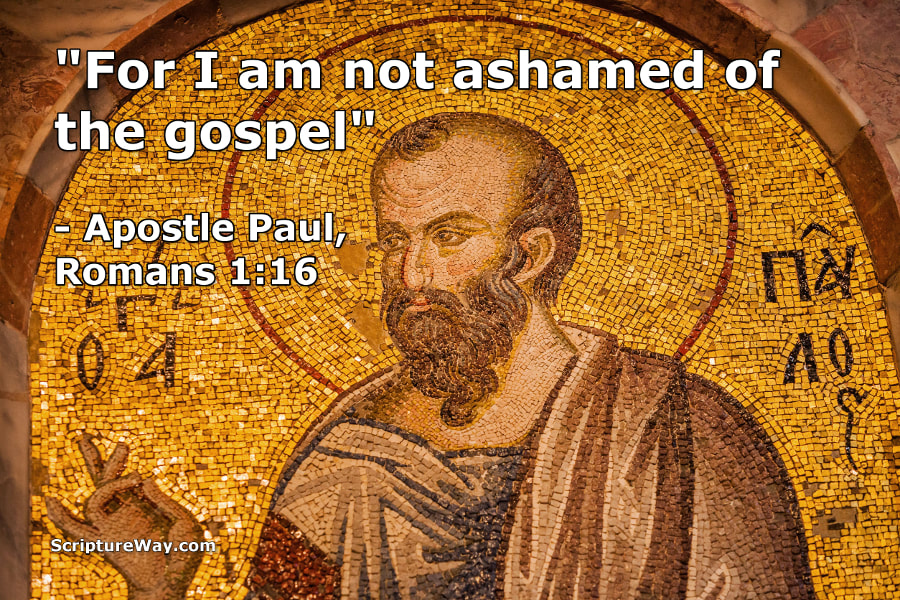This lesson is the second in a series on what "to be saved" means in the Bible. The first lesson described what "to be saved" means in the Old Testament (Ref. 1). This lesson describes what "to be saved" means in the New Testament.
This lesson uses scripture quotations from the English Standard Version (ESV) and the New American Standard Bible (NASB) (Ref. 2).
Consider. What do the words, "to be saved," mean to you? How does a person become saved?
1. "To be saved" in the New Testament means "to be delivered out of danger into safety" and "to be made well or whole."
The Greek word, sózó, translated as saved in Acts 16:31 occurs over 100 times in the New Testament (Ref. 3). Sózó (pronounced sode'-zo) means to deliver, heal, make whole, preserve, and save (Ref. 3). When God saves us, God delivers us out of danger into his provisions (safety).
Items "a," "b," "c," and "d" below provide examples from the New Testament for what it means to be saved.
a. Jesus saves people through storms(1). Jesus saved his disciples when they were afraid
Matthew 8:25-26 -- "And they went and woke him, saying, 'Save us, Lord; we are perishing.' 26 And he said to them, 'Why are you afraid, O you of little faith?' Then he rose and rebuked the winds and the sea, and there was a great calm." (Read the entire account: Matthew 8:23-27.)
(2). Jesus saved Peter when he doubted
Matthew 14:30-31, brackets added -- "But when he [Peter] saw the wind, he was afraid, and beginning to sink he cried out, 'Lord, save me.' 31 Jesus immediately reached out his hand and took hold of him, saying to him, 'O you of little faith, why did you doubt?' " (Read the entire account: Matthew 14:22-33.)
Notice in these examples that Jesus saved them even when they had little faith. Let that thought encourage you and calm you in whatever storm you are going through. b. Jesus saves people when they are lost
Luke 19:8-10 -- "And Zacchaeus stood and said to the Lord, 'Behold, Lord, the half of my goods I give to the poor. And if I have defrauded anyone of anything, I restore it fourfold.' 9 And Jesus said to him, 'Today salvation has come to this house, since he also is a son of Abraham. 10 For the Son of Man came to seek and to save the lost.'" (Read the entire account: Luke 19:1-10).
In Luke 19:10, the Greek word for lost, apollumi (ap-ol'-loo-mee), has a more severe meaning than just needing directions to point the way. Apollumi (being lost) implies to die with the implication of ruin and permanent (absolute) destruction by experiencing a miserable end (Ref. 4). Jesus Christ came to save Zaccheus, you, and me from experiencing ruin, permanent destruction, and a miserable end. c. Jesus saves suffering people and makes them well (healed and whole)
The Greek word sózó which means save also means make well, heal, and restore to health (Thayer's Greek Lexicon, Ref. 3). The New Testament strongly teaches the healing nature of being saved.
(1). Jesus healed the woman with a hemorrhage
Mark 5:33-34, brackets added -- "But the woman, knowing what had happened to her, came in fear and trembling and fell down before him and told him the whole truth. 34 And he said to her, 'Daughter, your faith has made you well [saved you]; go in peace, and be healed of your disease.'" (Read the entire account: Mark 5:25-34.)
(2). Jesus healed Bartimaeus from blindness
Mark 10:51-52, brackets added -- "And Jesus said to him, 'What do you want me to do for you?' And the blind man said to him, 'Rabbi, let me recover my sight.' 52 And Jesus said to him, 'Go your way; your faith has made you well [saved you].' And immediately he recovered his sight and followed him on the way." (Read the entire account: Mark 10:46-52.)
(3). Church elders are to pray for the sick to be restored (saved)
James 5:14-15, brackets added -- "Is anyone among you sick? Let him call for the elders of the church, and let them pray over him, anointing him with oil in the name of the Lord. 15 And the prayer of faith will save [restore] the one who is sick, and the Lord will raise him up. And if he has committed sins, he will be forgiven."
When you are suffering and need healing, seek the Lord Jesus Christ in prayer and faith, and trust him for the results.
d. God will save people who call on him from the day of the Lord and from the wrath of God against sin(1). People who call upon the name of the Lord will be saved from the day of the Lord
The prophet Joel describes the day of the Lord in Joel 2:30-32. In Joel 2:31, he describes the day of the Lord as "great and awesome [where awesome means to be feared]" (Ref. 5). Then, Joel adds "And it shall come to pass that everyone who calls on the name of the Lord shall be saved [delivered, escape]" (Joel 2:32, brackets added; Ref. 6). On Pentecost, the Apostle Peter quoted Joel 2:28-32 in Acts 2:17-21.
"Calling on the name of the Lord" means "to adore and worship" the Lord and "to invoke" [petition, appeal to, and make an earnest request to] the Lord in prayer (Ref. 7, Ref. 8). God has promised -- people who call on him (adore, worship, appeal to, and pray to him) will be saved. When you believe in Christ, the time of his return will be a time of salvation, not a time of fear. Thank God and rejoice in that promise. (2). God will save believers in Christ from the wrath of God against sin
Romans 5:8-10 -- "but God shows his love for us in that while we were still sinners, Christ died for us. 9 Since, therefore, we have now been justified by his blood, much more shall we be saved by him from the wrath of God. 10 For if while we were enemies we were reconciled to God by the death of his Son, much more, now that we are reconciled, shall we be saved by his life."
According to HELPS Word-studies, the wrath of God refers to God's fixed, controlled, passionate feeling against sin (Ref. 9). As believers in Christ, we are justified [made righteous] by the blood of Christ (Ref. 10, Romans 5:9). That is why we who believe in Christ will be saved by him from the wrath of God against sin (Romans 5:9-10). 2. Biblical Principles about Being Saveda. God was so moved by his love for the world that he has already provided the way for the world to be saved
John 3:16 -- "For God so loved the world, that he gave his only Son, that whoever believes in him should not perish but have eternal life."
b. God sent his Son not to judge the world, but that the world might be saved through him
John 3:17 -- Jesus said to Nicodemus, "For God did not send the Son into the world to judge the world, but so that the world might be saved through Him." Nicodemus, a Pharisee (John 3:1), may have been expecting a Messiah that would destroy Israel's Gentile enemies (Ellicott's Commentary on John 3:17, Ref. 11). Jesus came at that time not to initiate the final judgment of the world, but to provide the way for the people of the world -- Gentiles and Jews -- to be saved.
c. For those who believe in Christ, God has saved us from our former life of sin
Romans 5:8 -- "But God demonstrates His own love toward us, in that while we were still sinners, Christ died for us."
Ephesians 2:4-5 -- "But God, being rich in mercy, because of the great love with which he loved us, 5 even when we were dead in our trespasses, made us alive together with Christ—by grace you have been saved." d. God has provided his Son, Jesus Christ, as the only way by which people are saved
Acts 4:10,12 -- The Apostle Peter referred to Jesus Christ of Nazareth when he said, "And there is salvation in no one else, for there is no other name under heaven given among men by which we must be saved."
e. Our only "to do" to become saved is to believe in Jesus Christ, God's Son
Acts 16:30-31, brackets added -- "Then he [the Philippian jailer] brought them [Paul and Silas] out and said, 'Sirs, what must I do to be saved?' 31 And they said, 'Believe in the Lord Jesus, and you will be saved, you and your household.'"
The Greek word for believe means trust in, have faith in, and have confidence in (Ref.12). 3. Salvation Prayer
Apply. If you are not yet a believer in Jesus Christ, tell him you are sorry for all the sins in your life (1 John 1:9), and put your faith and trust in him. Tell Jesus that you believe in him and that you believe he died for you (Romans 5:8). Tell Jesus that you believe in your heart that God raised him from the dead (Romans 10:9). Thank Jesus for being your Savior and Lord.
"Everyone who calls on the name of the Lord will be saved" (Romans 10:13).
Related Lessons
"What Does 'To Be Saved' Mean in the Old Testament?" (Psalm 18:3) "God's Offer of Salvation and Eternal Life" (John 3:16) "Faith Comes from Hearing" (Romans 10:17)
References
1. http://www.scriptureway.com/home/what-does-to-be-saved-mean-in-the-old-testament 2. https://www.biblegateway.com/ 3. https://biblehub.com/greek/4982.htm 4. https://biblehub.com/greek/622.htm 5. https://biblehub.com/hebrew/3372.htm 6. https://biblehub.com/hebrew/4422.htm 7. https://biblehub.com/greek/1941.htm 8. https://www.merriam-webster.com/dictionary/invoke 9. https://biblehub.com/greek/3709.htm 10. https://biblehub.com/greek/1344.htm 11. https://biblehub.com/commentaries/ellicott/john/3.htm 12. https://biblehub.com/greek/4100.htm
2 Comments
This article presents five Biblical keys to effective prayer -- pray with other Christians, pray in faith, confess your sin, pray according to the will of God, and pray in the name of Jesus. This article also discusses the results of effective prayer.
Introduction
Prayer is one of the most important topics we will ever discuss as Christians. Prayer is communication with God. Prayer helps us receive God's peace and healing in the midst of our problems and concerns. Prayer helps us discern God's will for our lives. Prayer encourages others, protects others, and empowers others to further the ministry of Christ in the world.
It is to our advantage to learn to pray effectively. Why? Because "The effective prayer of a righteous man can accomplish much" (James 5:16). The Bible gives us guidance in how to pray effectively. Keys to Effective Prayer1. Pray with other Christians
James 5:14 instructs us, "Is anyone among you sick? Then he must call for the elders of the church and they [third person plural] are to pray over him, anointing him with oil in the name of the Lord" (James 5:14, brackets added).
Of course, God hears our prayers when we are alone and are praying in secret (Matthew 6:5-6). However, Scripture also teaches us that it is advantageous for us to pray with our companions in Christ. Recall that Jesus sent out his disciples in pairs (Mark 6:7). He gave them [third person plural] authority over unclean spirits, with the results that they cast out many demons, anointed sick people with oil, and healed them (Mark 6:13). 2. Pray in faith
James 5:15 tells us, "And the prayer offered in faith [Greek word pistis, which means persuasion, come to trust] will restore the one who is sick, and the Lord will raise him up, and if he has committed sins, they will be forgiven him" (James 5:15, brackets added, Ref. 1). When we pray in faith, God is pleased because we believe that "He is" and that "He is a rewarder of those who seek Him" (Hebrews 11:6). Note that faith, "divine persuasion," is a gift that God gives to believers (Ephesians 2:8-9, Ref. 1, Acts 16:14).
3. Confess your sin and receive forgiveness
This teaching -- that confession of sin is a prerequisite for effective prayer -- may seem strange to some, even Christians. However, this key cannot be overlooked if we are to pray effectively.
John writes about confessing our sins to God, "If we confess our sins, He is faithful and righteous to forgive us our sins and to cleanse us from all unrighteousness" (1 John 1:9). When we harbor unforgiven sin, or anger or unforgiveness towards others, that sin can block the channel of God's power through us in our prayers. Refer to Matthew 5:22-24, Matthew 6:14-15, James 1:20, and Psalm 66:18. To become effective prayer channels for God when we minister to others or pray for ourselves, we should first take time to confess our sins and to receive God's forgiveness through God's Son, Jesus Christ (1 John 1:7, 9). 4. Pray confidently according to the will of God
John tells us, "This is the confidence [bold resolve] which we have before Him, that, if we ask anything according to His will [God's desire, preferred will], He hears us" (1 John 5:14, brackets added, Ref. 2, Ref. 3).
Praying in God's will includes trusting God with the outcome. Recall that Jesus said to his Father, "Not My will, but Yours be done" (Luke 22:42). As believers in Christ and as children of our heavenly Father (John 1:12), we can learn God's will through prayer (speaking with and listening to God), God's word, and the guidance of the Holy Spirit (John 16:13). If we do not know God's will in a matter, we should ask him (James 1:5). 5. Pray in the name (character and authority) of Jesus
Jesus said to his disciples (and by extension to us as believers), "Whatever you ask in My name, that will I do, so that the Father may be glorified in the Son. (14) If you ask Me anything in My name, I will do it" (John 14:13-14).
When we pray in Jesus' name, we pray representing his character, reputation, and authority. We pray representing Christ, not ourselves (Ref. 4). Praying in Jesus' name should not be just a religious phrase we tack on at the end of our prayers. We should discern God's will and then pray our entire prayer in Jesus' name -- in his behalf and for his glory. The Results of Effective Prayer
Before we close this lesson, let's gain further insight by looking at two word definitions in James 5:16. The New American Standard Bible (1995) says, "The effective prayer of a righteous man can accomplish much" (James 5:16, NASB1995).
In James 5:16 the Greek word for effective in "effective prayer" is the verb energeó. Energeó means energizing, working, and displaying activity (Ref. 5). HELPS Word-studies illustrates this term by the example of "an electrical current energizing a wire, bringing it to a shining light bulb" (Ref. 5). Like the wire that brings electrical energy to turn on a light bulb, our effective prayers are channels for God's energy and power to work change in situations for others. The James 5:16 scripture also tells us our effective prayers can accomplish much. The Greek word translated as can accomplish much is ischuó. Ischuó means to prevail, to engage the resistance with combative, confrontive force to achieve what the Lord gives us faith to achieve (Ref. 6). Our effective prayers engage the resistance. Finally, a word about trusting God. Many times when we pray fervently for others we will see improvements including peace and healing. However, sometimes when we pray in faith and apply all the keys in prayer that God has given to us, the results may not come quickly or turn out the way we hope. In those situations we must continue to trust God. God helps us through all of life's difficulties, and for believers in Jesus Christ, God will ultimately bring us into his presence in heaven.
"Come now, let us reason together, says the Lord: though your sins are like scarlet, they shall be as white as snow; though they are red like crimson, they shall become like wool." (Isaiah 1:18)
This lesson is the first in a series on the "Comes" of God's word. This lesson describes God's invitation in Isaiah 1:18, "Come now, let us reason together, says the Lord: though your sins are like scarlet, they shall be as white as snow."
Consider. In Isaiah 1:18-20 (Old Testament), God's forgiveness was conditional on the people's obedience to God. How do people today receive God's forgiveness now that Christ has paid the penalty for sin?
Introduction
Being accused of having hands full of blood was a serious accusation. Yet, that is exactly how the Lord accused the people of Judah and Jerusalem (Isaiah 1:1) in Isaiah 1:15, "Even though you make many prayers, I will not listen; your hands are full of blood." Having hands full of blood is a symbol for the cruel wrongs the people had committed including the guilt of actual murder (Isaiah 1:21, Ref. 1). Isaiah had already spoken against the people for their rebellion against God (Isaiah 1:2) and for the insincerity of their sacrifices, offerings, festivals, and prayers (Isaiah 1:11-15).
Come Now
In Isaiah 1:18, God says "Come now." The Hebrew word for come is halak, which means to go, come, walk (Ref. 2). Here in Isaiah 1:18 "Come" is a summons for the recipient of the message to approach the speaker (God). Although God does not force the people of Judah and Jerusalem to come to him, God strongly urges the people to come to him that they might receive his pardon. Likewise, today God strongly urges all sinners to come to him.
Let Us Reason Together
The Hebrew word for let us reason together, yakach, means to decide, adjudge, prove, and argue (Ref. 3, Job 13:15). The idea is that of a legal process in which each party maintains his own case (Ref. 4, Isaiah 43:26). God proposes to present to the people of Judah and Jerusalem the principles on which he is willing to forgive their sins and bestow his pardon (Ref. 5). God describes the terms for pardon in Isaiah 1:18-20.
Though Your Sins Are Like Scarlet The Crimson or Scarlet Worm (Ref. 7) The Crimson or Scarlet Worm (Ref. 7)
The stain of the people's sins are bright red and indelible like the scarlet dye used by the ancients. The ancients made scarlet and crimson dyes from the dried bodies of the insect (worm), Coccus ilicis found on oak trees in Spain and in the countries east of the Mediterranean (Ref. 5, Ref. 6, Ref. 7).
When it was time for the female Coccus ilicis to give birth, she would attach herself permanently to an oak tree. Her body protected her eggs until the larvae were hatched and able to live on their own. As the mother died, she oozed a crimson fluid which stained her body and the surrounding wood. The death of the female Coccus ilicis paints a picture of the death of Christ who sacrificed his blood on the wood of the cross that others, by believing in him, may live (Ref. 7, Ref. 8).
The scarlet dye was indelible. Cotton material was dipped in this color twice so the stain was permanent (Ref. 5). The stain of the red dye (and likewise the stain of sin in the human heart) could not be washed away by man alone. That is why we as sinners need God's action to wash us clean.
The scarlet dye was known since early in the Old Testament times, centuries before the prophet Isaiah. For further study, I suggest you check these additional references for scarlet in the Bible:
They Will Be White as Snow
Only God can forgive sin. Only God can cleanse people and wash away their sin. David recognized this principle. He prayed to God, "Have mercy on me, O God, according to your steadfast love; according to your abundant mercy blot out my transgressions. Wash me thoroughly from my iniquity, and cleanse me from my sin!" (Psalm 51:1-2). David also wrote, "Wash me, and I shall be whiter than snow" (Psalm 51:7). White symbolizes innocence and purity (Ref. 9). "White as snow " is "a powerful figurative description of the result of forgiveness" (Ref. 10 below).
Though They Are Red Like Crimson, They Shall Be as Wool Scarlet and Crimson Colors (Ref. 11) Scarlet and Crimson Colors (Ref. 11)
Scarlet and crimson are similar reddish colors. Scarlet is bright red with an orange tint. Crimson is a strong, bright, deep red color combined with some blue or violet, resulting in a small degree of purple (Ref. 11). Crimson is associated with the stain of blood (Isaiah 1:15, Ref. 12). The ancients employed crimson color to dye wool (Ref. 5).
The Hebrew word for red in the phrase "red like Crimson" is adom, which means glaring, flagrant in Isaiah 1:18 (Brown-Driver-Briggs, Ref. 13). Though their sins are flagrant and appear as deep stains, God, upon their repentance and reformation, will remove their sins so they will be like wool restored to its original, undyed whiteness (Ref. 14). Forgiveness - By Obedience or by Faith?
In the Old Testament, God's relationship with man was based on obedience to God. Isaiah confirms this point in regard to God's forgiveness. In Isaiah 1:18 God offers forgiveness and cleansing to the people of Judah and Jerusalem. However, God's forgiveness and cleansing was conditional based on their willingness to obey God. Isaiah 1:19-20 describes the conditions for God's forgiveness, and the consequences for not obeying God. "If you are willing and obedient, you shall eat the good of the land; but if you refuse and rebel, you shall be eaten by the sword; for the mouth of the Lord has spoken" (Isaiah 1:19-20, italics added). For further study on God's relationship with man in the Old Testament based on obedience, I suggest reading Deuteronomy 30:15-20.
In the New Testament, God's relationship with man is based on faith in Christ. The Apostle Paul writes, "For by grace you have been saved through faith. And this is not your own doing; it is the gift of God" (Ephesians 2:8). Faith in Christ means believing in, trusting in, and having confidence in Christ (Ref. 15). Peter preached to the Gentiles gathered in Cornelius' house that through the name of Jesus everyone who believes in him receives forgiveness of sins (Acts 10:34-43). God's power to cleanse our sins "white as snow" is through the blood of Christ (1 John 1:7). Summary - Main Principles
Let's review the main principles in this lesson:
1. God invites all sinners to come to him that we might receive his pardon (Isaiah 1:18). 2. The stain of sin is red as scarlet (Isaiah 1:18). 3. Only God can wash our sins white as snow (Isaiah 1:18, Psalm 51:7). As a result of Christ's death, we know that it is the blood of Jesus that cleanses us from all sin (1 John 1:7). 4. In the Old Testament, God's forgiveness was conditional on the people's obedience to God (Isaiah 1:18-20). In the New Testament, God provides forgiveness and cleansing through faith in Christ (Ephesians 2:8, Acts 10:43).
Apply. If you do not know Christ, come to him, confess your sin, and ask him to forgive you. Put your faith and trust in him and walk in the cleansed life that Christ has given you. If you do have faith in Christ as your Savior, walk with him in the light. Thank him for forgiving your sin and for cleansing you from all unrighteousness (1 John 1:7-9).
Related Lessons
"God's Great Invitation - Come, Satisfy Your Thirst" (Isaiah 55:1) "Jesus' Invitation - Come to Me and Rest" (Matthew 11:28-30)
References
1. https://biblehub.com/commentaries/cambridge/isaiah/1.htm Cambridge Bible for Schools and Colleges - Isaiah 1:15 2. https://biblehub.com/hebrew/1980.htm 3. https://biblehub.com/hebrew/3198.htm 4. https://biblehub.com/commentaries/cambridge/isaiah/1.htm Cambridge Bible for Schools and Colleges - Isaiah 1:18 5. https://biblehub.com/commentaries/barnes/isaiah/1.htm Barnes' Notes on the Bible - Isaiah 1:18 6. https://www.biblegateway.com/resources/encyclopedia-of-the-bible/Scarlet 7. https://www.discovercreation.org/blog/2011/11/20/the-crimson-or-scarlet-worm/ 8. https://studybible.info/strongs/H8438 9. https://www.biblegateway.com/resources/encyclopedia-of-the-bible/White 10. The NIV Study Bible, Zondervan Bible Publishers, 1985, note on Isaiah 1:18 11. https://en.wikipedia.org/wiki/Shades_of_red 12. https://biblehub.com/commentaries/ellicott/isaiah/1.htm Ellicott's Commentary for English Readers - Isaiah 1:18 13. https://biblehub.com/hebrew/119.htm 14. https://biblehub.com/commentaries/jfb/isaiah/1.htm Jamieson-Fausset-Brown Bible Commentary - Isaiah 1:18 15. https://biblehub.com/greek/4102.htm
"For I am not ashamed of the gospel, for it is the power of God for salvation to everyone who believes, to the Jew first and also to the Greek." (Romans 1:16)
This lesson explains the meaning of these phrases from the Apostle Paul in Romans 1:16: "For I am not ashamed of the gospel," "for it is the power of God for salvation to everyone who believes," and "to the Jew first and also to the Greek."
1. "I Am Not Ashamed of the Gospel"
Definitions:
Ashamed -- In Romans 1:16 the Greek word for ashamed is epaischunomai (pronounced ep-ahee-skhoo'-nom-ahee) (Ref. 1 - HELPS Word-studies). This word means to be disgraced, or personally humiliated like someone being "singled out" because they misplaced their confidence or support (Ref. 1). The world thought that Paul should be ashamed. To the Jews, "the thought of a crucified Messiah" was "a revolting folly" (Ref. 2 - Pulpit Commentary on 1 Corinthians 1:18). To the Greeks the worship of a crucified wrongdoer was a detestable superstition (Ref. 2). In contrast with the Jews and Greeks who thought that Paul should be ashamed, Paul in no way felt ashamed of his message about Jesus Christ. Paul did not shrink away from preaching Christ; instead, he glorified in it (Romans 1:15). As believers in Christ -- like Paul -- we should not be ashamed of our Lord and Savior. Likewise, we should not be ashamed to present the good news of salvation in Christ to others. Paul encouraged his protégé, Timothy, "Do not be ashamed of the testimony of our Lord or of me His prisoner, but join with me in suffering for the gospel according to the power of God" (2 Timothy 1:8).
Gospel -- The Greek word for gospel in Romans 1:16 is euaggelion (pronounced yoo-ang-ghel'-ee-on). Euaggelion means God's good news (Ref. 3). At the beginning of Jesus' ministry, the gospel was the glad tidings of the kingdom of God soon to be set up (Mark 1:14-15, Ref. 3 - Thayer's Greek Lexicon). After Jesus' death and resurrection, the gospel was (and still is) the good news that Jesus Christ has paid the penalty for our sin through his sacrificial death on the cross. When we repent of our sins and put our faith and trust in him, we receive forgiveness of our sins and the gift of eternal life. See Mark 1:14-15, Mark 10:45, John 3:16, Romans 5:8, Romans 6:23, Ephesians 2:8-9, and 1 John 1:9.
2. "For It Is the Power of God for Salvation to Everyone Who Believes"
Definitions:
Power -- The Greek word for power in Romans 1:16 is dunamis (pronounced doo'-nam-is). Dunamis means (miraculous) power, might, strength, and ability to perform (Ref. 4). Kenneth S. Wuest adds that "Dunamis is power, natural ability, inherent power residing in a thing by virtue of its nature, or, power which a person or living thing exerts or puts forth. The gospel is the inherent, omnipotent power of God operating in the salvation of a lost soul who accepts it" (Ref. 5 below). The Apostle Paul wrote to believers at Corinth, "For the word of the cross is foolishness to those who are perishing, but to us who are being saved it is the power of God" (1 Corinthians 1:18).
Salvation -- The Greek word for salvation is sótéria (pronounced so-tay-ree'-ah). HELPS Word-studies defines sótéria as "God's rescue which delivers believers out of destruction and into His safety" (Ref. 6).
Salvation is entirely God's doing, not something that we achieve by works or by "trying to live a good life" without Christ. Paul writes, "For by grace you have been saved through faith; and that not of yourselves, it is the gift of God; not as a result of works, so that no one may boast" (Ephesians 2:8-9). Believe -- The Greek word for believe is pisteuó (pronounced pist-yoo'-o). Pisteuó means to believe, to have faith in, to trust in, and to place confidence in (Ref. 7). The person who believes in Christ is a person who has put their faith, trust, and confidence in Christ. The phrase "to everyone who believes" describes the condition, or terms, on which God confers salvation (Ref. 8). God confers salvation on sinners who by faith put their trust and confidence in God's Son, Jesus Christ. 3. "To the Jew First and Also to the Greek"
The phrase "to the Jew first and also to the Greek" means that God then and now offers salvation to all people, to Jews and to all who are not Jews (Ref. 9). God's offer of salvation to all people is consistent with John 3:16, "For God so loved the world, that He gave His only Son, so that everyone who believes in Him will not perish, but have eternal life."
Salvation is the present possession of all people who believe in (have faith, trust, and confidence in) Jesus Christ (Acts 16:30-31, Mark 16:15-16, Acts 8:34-39).
The world thought then (and still thinks now) that Paul's message about Christ was foolishness (1 Corinthians 1:18, Ref. 10). Yet, Paul was neither disgraced nor ashamed of the gospel. Likewise, as believers in Christ, we should never be ashamed of the gospel. The gospel of Jesus Christ is the power of God for salvation to everyone who believes. Jesus Christ, through his sacrificial death on the cross, has procured forgiveness of sins and provides eternal life to all who put their faith and trust in him.
Apply. Show by your words and your deeds that you are not ashamed of the gospel of Jesus Christ.
Related Lessons
"The Word of the Cross - Foolishness or Power?" (1 Corinthians 1:18) "What Does 'To be Saved' Mean in the New Testament?" (Acts 16:31) "God's Offer of Salvation and Eternal Life" (John 3:16) "Stand Firm in the Faith" (1 Corinthians 16:13-14)
References
1. https://biblehub.com/greek/1870.htm 2. https://biblehub.com/commentaries/pulpit/1_corinthians/1.htm (Pulpit Commentary on 1 Corinthians 1:18) 3. https://biblehub.com/greek/2098.htm 4. https://biblehub.com/greek/1411.htm 5. Wuest's Word Studies from the Greek New Testament, Kenneth S. Wuest, Wm. B. Eerdmans Publishing Company, 1973, Volume One, commentary on Romans 1:16 6. https://biblehub.com/greek/4991.htm 7. https://biblehub.com/greek/4100.htm 8. https://biblehub.com/commentaries/barnes/romans/1.htm (Notes on the Bible by Albert Barnes [1834] - Romans 1:16) 9. https://biblehub.com/commentaries/ellicott/romans/1.htm 10. http://www.ScriptureWay.com/home/the-word-of-the-cross-foolishness-or-power
"Be on the alert, stand firm in the faith, act like men, be strong. Let all that you do be done in love." (1 Corinthians 16:13-14)
This article explains the Apostle Paul's exhortation to the Corinthian church to be alert, stand firm in the faith, act like men, be strong, and be loving (1 Corinthians 16:13-14).
Consider. In what areas of your personal life today are you being challenged to stand firm in your faith in Christ? In what areas is the church of Christ being challenged today to stand firm in our faith in Christ and the word of God?
Introduction
The Apostle Paul concludes his letter to the Corinthian church with a concise and sharp series of exhortations. The first four exhortations in 1 Corinthians 16:13 - be alert (be watchful), stand firm in the faith, act like men (be courageous), and be strong - are like "pistol shots" or shouted military commands (Ref. 1). In contrast, the last exhortation in 1 Corinthians 16:14 - "Let all that you do be done in love" - is more gentle.
Paul loved the church at Corinth, and he spent much time teaching them (Acts 18:1, 5, 11). Even though Paul loved them and had taught them about Christ, he was concerned that they were "schismatic and factious," "ill-grounded in regard to very fundamental doctrines of the faith," undisciplined, and incapacitated for "vigorous warfare" (Ref. 1). Paul includes these sharp and emotional exhortations at the end of his letter to help them preserve their souls and to stand firm against the enemies of truth. Be On the Alert
The Greek word for be on the alert is grégoreó. Grégoreó means literally, stay awake, and figuratively, be vigilant, responsible, and watchful (Ref. 2). Paul's exhortation to the Corinthian church (to be alert, watchful) applies equally to us as believers in Christ today. Paul urged the Corinthian church to guard constantly against evils such as dissension, erroneous doctrine, false teaching, and temptations, "lest the enemies of truth and of holiness should steal upon them and surprise them" (Ref. 3). "They were to watch with the same vigilance that is required of a sentinel who guards a camp, lest an enemy should suddenly come upon them, and surprise the camp when the army was locked in sleep" (Ref. 3).
Stand Firm in the Faith
The Greek word for stand firm in 1 Corinthians 16:13 is stékó which means to persist, persevere, and stand fast (Ref. 4). The Greek word for faith is pistis which means belief, trust, faith, and confidence (Ref. 5). As believers in Christ, in addition to being watchful, we are to stand firm in the faith - that is, stand firm in our belief, trust, and confidence in Christ and in the word of God. I suggest these biblical examples for standing firm in the faith:
a. Believing in and defending the truths of the Bible
All of God's word is the truth. "The sum of Your word is truth,
And every one of Your righteous judgments is everlasting" (Psalm 119:60). Jesus Christ himself is the truth. "I am the way, and the truth, and the life; no one comes to the Father except through Me" (John 14:6). b. Believing in and relying upon the inspiration and authority of the Bible
"All Scripture is inspired by God and profitable for teaching, for reproof, for correction, for training in righteousness; so that the man of God may be adequate, equipped for every good work" (2 Timothy 3:16-17).
c. Maintaining full confidence in our Lord and Savior Jesus Christ
We are able to stand firm not because of ourselves but because of who we trust -- Jesus Christ. David wrote, "My help comes from the Lord, who made heaven and earth" (Psalm 121:2). Paul wrote, "I can do all things through Christ who strengthens me" (Philippians 4:13).
d. Remaining faithful to God when we encounter temptation
"No temptation has overtaken you but such as is common to man; and God is faithful, who will not allow you to be tempted beyond what you are able, but with the temptation will provide the way of escape also, so that you will be able to endure it" (1 Corinthians 10:13). "How can a young man keep his way pure? By guarding it according to your word. (11) I have stored up your word in my heart, that I might not sin against you" (Psalm 119:9, 11).
e. Trusting God through distress and affliction
"Many are the afflictions of the righteous, but the Lord delivers him out of them all" (Psalm 34:19).
f. Being faithful (with love) to biblical standards, not comprising our standards to mimic world culture
In contrast to imitating the world, Jesus said that we (and his church) are to be salt and light (Matthew 5:13-16). We are to love others (John 13:34-35, Matthew 5:43-44) but not love the things or the lusts of the world (1 John 2:15-16).
Act Like Men (Be Courageous and Brave)
Paul uses the Greek word andrizó, which the 1995 New American Standard Bible translates as act like men (Ref. 6). Andrizó means "properly, to act as a full-grown, mature man; (figuratively) to be responsible and courageous by taking the initiatives God reveals through faith" (HELPS Word-studies, Ref. 7). Note the connection in the Greek definition between God providing the Christian believer faith and the Christian believer being courageous and brave to stand firm. The Greek word andrizó (act like men) occurs only once in the New Testament - here in 1 Corinthians 16:13 (Englishman's Concordance, Ref. 7).
Paul's message applies to both male and female believers today. We are to be spiritually mature, courageous, and brave as we stand firm in the faith. Be Strong
In 1 Corinthians 16:13 Paul uses an unusual word which is translated as be strong. The Greek word used here for be strong is krataioó. Krataioó (be strong) means to prevail by God's dominating strength working in the believer through faith (Ref. 8). Paul uses the same Greek word krataioó in his prayer for the church at Ephesus. "For this reason I bow my knees before the Father, from whom every family in heaven and on earth derives its name, that He would grant you, according to the riches of His glory, to be strengthened with power through His Spirit in the inner man ..." (Ephesians 3:14-16, italics added).
Let All That You Do Be Done in Love
Paul transitions from the captain's words of command in 1 Corinthians 16:13 to the gentler exhortation, "Let all that you do be done in love" (1 Corinthians 16:14). The Greek word for love in this verse is agapé, which means divine love (what God prefers) (Ref. 9). As believers in the Lord Jesus Christ, when we stand firm in the faith, we are to show God's divine love to others in everything that we say and do. Paul describes the love we are to show others when he wrote, "Love is patient, love is kind and is not jealous; love does not brag and is not arrogant, does not act unbecomingly; it does not seek its own, is not provoked, does not take into account a wrong suffered ..." (1 Corinthians 13:4-5).
Apply. In what area of your personal life do you need God's strength to help you stand firm and be faithful to God? What can you do to help the church of Christ today to love others while standing firmly for faith in Christ and God's word?
References
1. https://biblehub.com/commentaries/maclaren/1_corinthians/16.htm 2. https://biblehub.com/greek/1127.htm 3. https://biblehub.com/commentaries/barnes/1_corinthians/16.htm 4. https://biblehub.com/greek/4739.htm 5. https://biblehub.com/greek/4102.htm 6. https://www.biblegateway.com/passage/?search=1+Corinthians+16%3A13&version=NASB 7. https://biblehub.com/greek/407.htm 8. https://biblehub.com/greek/2901.htm 9. https://biblehub.com/greek/26.htm
Photo source: FreeBibleImages.org

Permanent Sheepfold Enclosure - Holy Land. Photo Copyright David Padfield. Used under license. Permanent sheepfolds were built on the sunny side of valleys where there is protection from cold winds. These had stone walls, 4-5ft high and one entrance guarded by the shepherd. Thorns were often put on the top of walls to deter wild animals. Jesus referred to such a sheepfold and to thieves and robbers climbing over the wall (John 10:1-3).
"So Jesus said to them again, 'Truly, truly, I say to you, I am the door of the sheep.' " (John 10:7, Ref. 1)
"I am the door; if anyone enters through Me, he will be saved, and will go in and out and find pasture." (John 10:9)
"Christ is the Door. And what greater security has the church of God than that the Lord Jesus is between it and all its enemies? ... Here are plain directions how to come into the fold; we must come in by Jesus Christ as the Door." -- Matthew Henry (Ref. 2)
This lesson is the third in a series on the "I AM" statements of Christ. This lesson discusses Jesus' "I am the door" statements in John 10:7 and John 10:9.
Consider. Have you entered into the church of God by believing in the Lord Jesus Christ? Are you experiencing spiritual nourishment in Christ? "If anyone enters through Me" - John 10:9
We enter the sheepfold, the church of God, through Jesus Christ (and only through Jesus Christ). Jesus said, "Truly, truly, I say to you, I am the door of the sheep" (John 10:7). We enter that door when we place our faith and trust in Jesus Christ. "As the only proper way of entering the fold was by the door, so the only way of entering the church of God is by believing on him and obeying his commandments" (Ref. 3).
Jesus said, "I am the way, and the truth, and the life; no one comes to the Father but through Me" (John 14:6). "He will be saved"
Once we have entered the door by faith and trust in Jesus Christ, we are saved. Jesus delivers us from perils such as ravenous wolves and false shepherds (Ref. 4, John 10:1-2). Jesus frees us from the power, guilt, and penalty of sin (Romans 8:1-2, Ephesians 2:1-9). Jesus gives us eternal security. Jesus said, "My sheep hear My voice, and I know them, and they follow Me; and I give eternal life to them, and they will never perish; and no one will snatch them out of My hand" (John 10:27-28).
HELPS Word-Studies defines saved as rescued from destruction and brought into divine safety (Ref. 5). "And will go in and out and find pasture"
To go "in and out" is the common Old Testament expression to denote free activity of daily life (Ref. 6). When Moses charged the Israelites at Mount Gerizim to obey the Lord, he said, "Blessed shall you be when you come in, and blessed shall you be when you go out" (Deuteronomy 28:6, Deuteronomy 27:11-12, Deuteronomy 28:1-2). David wrote about the Lord, the Keeper of Israel (Psalm 121:5). David said, "The Lord will guard your going out and your coming in from this time forth and forever" (Psalm 121:8).
Through Jesus (because he is the door), we have security for our daily needs and nourishment for our souls. Under the care of Jesus, we find pasture - food for our souls (Ref. 7). David wrote, "The Lord is my shepherd; I shall not want. He maketh me to lie down in green pastures: he leadeth me beside the still waters" (Psalm 23:1-2 KJV).
Apply. Have you entered the sheepfold of Christ by believing in him? If not, then put your faith and trust in him today. Are you spending time with Jesus daily to receive spiritual nourishment? How can you improve in this area?
References
1. http://www.ScriptureWay.com/home/when-jesus-said-truly-truly-what-did-he-mean 2. https://biblehub.com/commentaries/mhc/john/10.htm 3. https://biblehub.com/commentaries/barnes/john/10.htm 4. https://biblehub.com/commentaries/pulpit/john/10.htm 5. https://biblehub.com/greek/4982.htm 6. https://biblehub.com/commentaries/egt/john/10.htm 7. https://biblehub.com/commentaries/benson/john/10.htm
Today's lesson explores the Bible verses behind the excellent hymn, "Teach Me Thy Way, O Lord."
Hymn Author and Composer Benjamin Mansell Ramsey (Ref. 2) Benjamin Mansell Ramsey (Ref. 2)
Benjamin Mansell Ramsey wrote the text for "Teach Me Thy Way, O Lord" based on Psalm 27:11 and several additional Scripture verses. Mr. Ramsey also composed the tune, "Camacha," which we use today when singing this hymn.
Benjamin Mansell Ramsey (1849 - 1923) was an English organist and amateur composer (Ref. 1). He also was a well-known music teacher near Bournemouth, England. Mr. Ramsey composed songs, piano pieces, and carols. He also wrote works on music theory (Ref. 2). Wikipedia reports that Mr. Ramsey also conducted an amateur orchestra in the 1880s, and was involved in establishing the Bournemouth Municipal Orchestra in 1893 (Ref. 1). He is best known for his hymn tune, "Camacha," and the text he wrote for "Teach Me Thy Way, O Lord" in 1919. For those of you who are interested in geography, Bournemouth is located on the south coast of England (see map, Ref. 3). Scripture Allusions
I suggest that you refer to the attached hymn sheet music for the following discussion of the Scripture verses and the hymn text (Ref. 4).
"Teach me Thy way." Mr. Ramsey skillfully wrote this hymn around the Biblical phrase, "Teach me Thy way." He included the phrase, "Teach me Thy way," 13 times in verses one through four. In the Old Testament, the Way of the Lord referred to keeping God's commandments (Deuteronomy 5:33, Ref. 5). In Joseph Benson's Commentary, the phrase "Teach me Thy way, O Lord" means "What course I shall take to please thee, and to discharge my duty, and to save myself from ruin" (Ref. 6). David, the Psalmist, asked God to teach him God's way in Psalm 27:11 and Psalm 86:11. Psalm 25:4-5 is similar. David’s request to God, "Teach me Thy way, O Lord," is an excellent example for us to follow (Ref. 5). "Thy guiding grace afford" (hymn, verse 1). These words call to my mind Jesus' promise in John 16:13, "But when He, the Spirit of truth, comes, He will guide you into all the truth." Jesus promised us as believers that the Holy Spirit will guide us. The Greek word for guide in John 16:13 is hodégeó, which literally means "to show the way" (Ref. 7, Ref. 8). Now we can see the close connection between the prayerful hymn words in verse 1, "Teach me Thy way, O Lord" and "Thy guiding grace afford." As believers in Christ, we need the Holy Spirit's guidance to teach us God's way and truth in each of our life's circumstances.
"Help me to walk aright, more by faith, less by sight" (hymn, verse 1). This hymn phrase likely refers to Paul's statement in 2 Corinthians 5:7, "For we walk by faith, not by sight."
"Make Thou my pathway plain" (hymn, verse 3). Psalm 27:11 begins with the words, "Teach me thy way, O Lord" and ends with the words, "and lead me in a plain path, because of mine enemies" (KJV translation). The transliteration of the Hebrew word for plain is mishor (Ref. 9). In Psalm 27:11, mishor means literally a level place (free from obstacles) and figuratively, a place of safety, comfort, prosperity (Ref. 9). In the literal sense, a plain is a level area or plateau as compared to a mountainous area, for example, 1 Kings 20:22-25. In the figurative sense, David's prayer to make his pathway plain (Psalm 27:11) was to request that God would make his way safe (Ref. 10).
Mr. Ramsey wrote in verse 3 of the hymn, "Shine through the cloud and rain, through sorrow, toil, and pain; Make Thou my pathway plain, teach me Thy way!" With these words, we pray that God will make our way safe and that God will comfort us through these difficult times.
"Until the race is won" and "Until the crown is won" (hymn, verse 4). Mr. Ramsey likely drew inspiration from 1 Corinthians 9:24-25 which alludes to both of these phrases. "Don’t you know that the runners in a stadium all race, but only one receives the prize? Run in such a way to win the prize. Now everyone who competes exercises self-control in everything. However, they do it to receive a crown that will fade away, but we a crown that will never fade away."
Let us resolve to run the race with endurance that God has given us, fixing our eyes on Jesus, the author and perfecter of faith (Hebrews 12:1-2).
Listen. I suggest that you listen to one or both of the following Youtube videos to hear examples of how the hymn can be sung.
Traditional hymn in 3/4 time - The Metropolitan Tabernacle, London congregation singing "Teach Me Thy Way, O Lord" - Click here. This contemporary, 4/4 time solo arrangement of "Teach Me Thy Way, O Lord" in 4/4 time will uplift you. Click here.
Apply. In what aspect of your life today do you need God to remove obstacles and to make your pathway plain or safe? Pray and ask God to teach you his way and to give you his guidance.
References
1. https://en.wikipedia.org/wiki/B._Mansell_Ramsey 2. http://www.hymntime.com/tch/bio/r/a/m/ramsey_bm.htm 3. https://www.worldatlas.com/eu/gb/eng/where-is-bournemouth.html 4. https://library.timelesstruths.org/music/Teach_Me_Thy_Way_O_Lord/ 5. http://www.scriptureway.com/home/the-way-of-the-lord-old-testament 6. https://biblehub.com/commentaries/benson/psalms/27.htm 7. https://biblehub.com/greek/3594.htm 8. http://www.scriptureway.com/home/the-spirit-of-truth 9. https://biblehub.com/hebrew/4334.htm 10. https://biblehub.com/commentaries/cambridge/psalms/27.htm |
Daily Bible Verse(Click the link above) AuthorMr. Whitney V. Myers. Christian. For more information, please visit the Author Page. Posting ScheduleI plan to provide new postings about once a month. Planned Topics(subject to change) Recent Posts(most recent three months) Popular Posts(top 10) Categories
All
Archives
July 2024
|
|
Copyright 2018-2024 Whitney V. Myers |
Listed in Feedspot's Top 100 Bible Study Blogs and Websites |






 RSS Feed
RSS Feed
